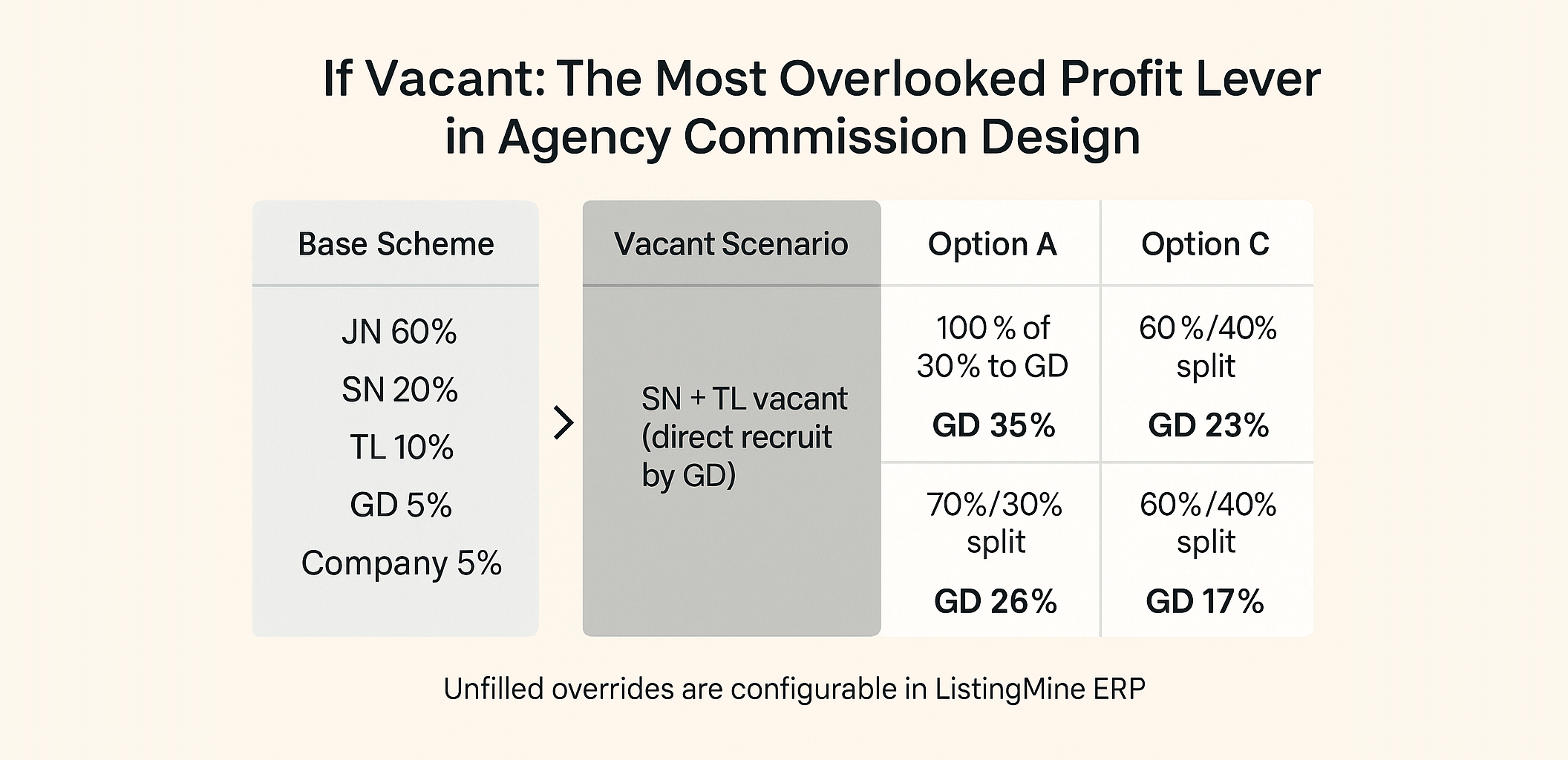If Vacant: The Most Overlooked Profit Lever in Agency Commission Design

Every agency boss focuses on the payout — who gets how much when a deal closes.
But very few pay attention to what happens when certain levels don’t exist in the hierarchy.
That single oversight can quietly decide whether your company earns steady profit from structure, or leaks margin every month without even noticing.
The Typical Structure
Let’s start with a standard override chain for illustration:
| Role | Typical Share |
|---|---|
| Junior Negotiator | 60% |
| Senior Negotiator | 20% |
| Team Leader | 10% |
| Group Director | 5% |
| Company Profit | 5% |
When a Junior Negotiator closes a deal, everyone in the hierarchy — from Senior up to Director — gets their portion, and the company keeps its base 5%. Everything seems fair and transparent.
But What If the Chain Is Broken?
Now imagine this:
A Group Director recruits a Junior Negotiator directly.
There’s no Senior Negotiator and no Team Leader in between.
In most legacy ERPs or manual setups, that missing middle is simply ignored — or worse, handled emotionally instead of strategically.
This is the “If Vacant” situation — and it happens far more often than most bosses realise.
The Usual (and Costly) Mistakes
Here’s what most agencies do when faced with missing mid-levels:
- Reward Everything Upward
The Group Director receives all missing overrides.
Example: 20% + 10% + 5% = 35% extra payout to one person.
This looks generous but quietly erodes company profit. - Reward Partially Upward
The Director gets only the next level’s share (20%).
The rest (10% + 5%) stays unused.
This keeps things simple but leaves no structured rule for future consistency. - No Defined Rule
Admins decide case by case.
This leads to inconsistency, agent complaints, and administrative confusion.
Without a system rule, every case turns into negotiation rather than process.
The ListingMine Way: Structured Logic, Flexible Control
In ListingMine ERP, every agency can predefine its “If Vacant” rule inside the commission structure.
That means the system automatically knows what to do when certain positions don’t exist. You can design the outcome in any way that fits your agency’s financial philosophy.
Example: Turning Vacancies into Strategy
Let’s revisit the same chain.
| Role | Normal Share | Vacant? | Distribution Logic |
|---|---|---|---|
| Junior Negotiator | 60% | No | Full |
| Senior Negotiator | 20% | Yes | — |
| Team Leader | 10% | Yes | — |
| Group Director | 5% | Active | Eligible |
| Company | 5% | Always | Retained |
Now, through ListingMine ERP, the admin can decide:
- Option A — Full Redistribution
Reward the Group Director with all missing overrides.
The missing 20% + 10% + 5% = 35% is added to the Director’s share.
Result: Motivates top leaders, but reduces company margin. - Option B — Partial Redistribution with Company Retention
Give the Director only part of the missing middle (for example, 70%) and retain 30% as company profit.
Formula:
If Vacant → Override 3 (Group Director) = 70%
If Vacant → Company Profit = 30%
Result: The Director is rewarded fairly, and the company gains structured margin without reducing morale. - Option C — Split Redistribution
Split the vacant portions among different roles for balance.
If Vacant → Override 3 = 60%
If Vacant → Override 4 = 20%
Remaining 20% → Company Profit
Result: Balanced fairness, no excessive payout, and retained profit automatically.
The Hidden Profit That’s Been There All Along
Most agency bosses see commission setup as a fixed structure — but it’s actually a policy tool.
Every time a team is incomplete, your ERP logic decides:
- Who benefits
- Who fills the gap
- Who earns the leftover
That leftover is not a loss — it’s an opportunity.
When configured right, your “If Vacant” settings can return 2–8% additional profit margin annually, just from systematic redistribution.
Why It Must Be Backed by Strategy
While this setting opens a way to earn hidden profit, it must be executed with strategic transparency. Your structure should always be explainable and defensible, so agents view it as fair policy rather than silent deduction.
That’s why in ListingMine ERP:
- Every rule is documented and visible to admins.
- Every vacancy redistribution is auto-recorded in the audit trail.
- Every override percentage is traceable in the commission report.
You’re not changing the payout — you’re governing it intelligently.
Closing Thought
Most agencies think profit comes only from recruiting more agents or closing more deals. But true scalability begins with fair systems that do not leak.
When you control what happens If Vacant, you are not just filling a gap — you are building a profit-aware structure that rewards performance, preserves fairness, and compounds your agency’s long-term sustainability.











































































































